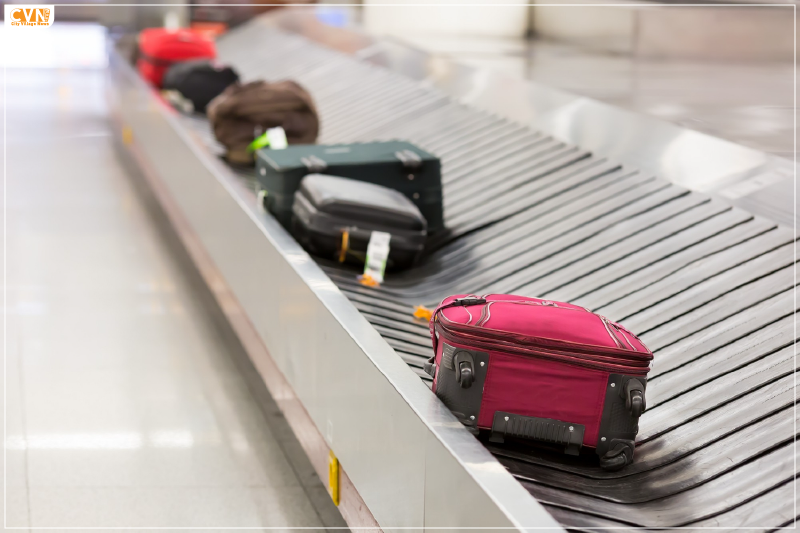Standing and waiting near the baggage claim carousel is one of the most disliked experiences in the world of modern air travel. Travelers wait impatiently for their baggage to show up, frequently worrying about misplaced bags, broken goods, or protracted delays. Even though handling baggage has long been a crucial element of airport operations, current technological developments, especially in the area of artificial intelligence (AI), are changing the game and offering passengers a faster, more comfortable travel experience. Continue reading to know more about artificial intelligence in baggage handling.
The Woes of Traditional Baggage Handling
It’s important to comprehend the difficulties and intricacies of conventional luggage systems before delving into how artificial intelligence is affecting baggage handling. Staff members at the airport manually sift, load, and track bags in this time-consuming procedure. Considering the massive amounts of luggage that airports handle on a daily basis, it’s a challenging task.
Errors and Mishandling: When baggage are mishandled, passengers may become displeased. Every day, millions of bags are transported, increasing the risk of handling errors.
Delays: Sorting and moving bags between flights takes a lot of time, which frequently results in missed connections and delays.
Lost Baggage: There’s always a dread of losing your bags. Although airlines make every effort to find and return misplaced luggage, this process is rarely perfect.
Inefficiencies: Handling baggage is an expensive aspect of airport operations due to the large personnel, space, and resource requirements of traditional methods.
Artificial intelligence Comes as a Ray of Hope
With the introduction of automation, real-time tracking, predictive analytics, and improved security, artificial intelligence (AI) promises to alleviate these baggage handling problems. Let’s examine how AI is changing the way that luggage is handled:
-
Organizing and Automating
Transportation and baggage sorting are being revolutionized by AI-driven robots and conveyor systems. These intelligent technologies are able to identify luggage, identify its destination, and plan an effective route for it. Automated methods speed up the sorting process and minimize human mistakes, guaranteeing that luggage are assigned to the appropriate flights.
-
Tracking in Real Time
Travelers can put an end to their worries over misplaced bags. AI-driven tracking technologies keep an eye on bags during their travels and give passengers and airline employees real-time updates. These tracking technologies make sure that bags are always where they should be by using machine learning algorithms and RFID technology.
-
Predictive Analytics
AI uses past data and meteorological information to forecast possible delays and redirect bags as necessary. Airlines can avoid interruptions by proactively managing baggage in anticipation of unfavorable circumstances, such as bad weather.
-
Enhanced Security
AI technology makes better security screening possible. Sophisticated algorithms have the ability to identify suspect objects or irregularities in baggage scans, improving security and streamlining the procedure in general. No matter if they are flying with domestic or international flights, all passengers will travel in safer conditions as a result.
-
Cost-Efficiency
AI-driven solutions have the potential to drastically lower labor costs, improving the economics of baggage handling. In addition to improving passenger services and resource allocation, airlines can maximize their profit margin.
Also Read: How Can Artificial Intelligence Help Us Get to Net Zero?
Artificial Intelligence Applications in Aviation Industry
Even though these artificial intelligence (AI) claims seem alluring, let’s examine some actual AI applications:
Airports of the Future
Airports all over the world are using AI in an effort to increase productivity and enhance the traveler experience. For instance, computer vision is used in the integrated smart baggage handling systems of the Hong Kong International Airport to automatically identify and sort cargo. As a result, procedures have been greatly simplified and the rate of baggage mishandling has dropped.
The Role of Robotics
Robots with artificial intelligence (AI), like those at Amsterdam Airport Schiphol, have revolutionized the handling of bags. By moving luggage across the terminal, these robots increase productivity and lessen the physical strain on airport workers.
Predictive Baggage Management
Predictive analytics is being used by British Airways to improve baggage handling. When flight problems are predicted, the airline can route luggage preemptively by assessing historical data and flight information. This guarantees that, even in difficult circumstances, luggage reaches their destinations with the least amount of delay.
Real-time Passenger Updates
AI-powered apps and systems are being used by airports and airlines more often to give passengers real-time luggage updates. With the use of this technology, passengers can monitor their bags from the time of check-in to the time of claim, giving them peace of mind all along the way.
Fully Automated Baggage Handling
Artificial intelligence in baggage handling is the future. We may see totally automated baggage handling systems in the coming years. From check-in to unloading at the destination, robots and AI-powered conveyors may manage every part of the procedure.
Sustainability
AI could help airlines and airports optimize baggage loading in order to improve fuel efficiency. This not only cuts carbon emissions but also promotes more environmentally friendly flight practices.
Also Read: Role of Artificial Intelligence in Revolutionizing the Tourism Industry
The Future of Baggage Handling
The future of luggage handling is brighter and more efficient than ever before, all because of artificial intelligence. Passengers should expect less stress, fewer lost bags, and more comfortable journeys. The deployment of AI-driven baggage handling technologies is transforming the aviation sector, making flying more enjoyable for everyone.
Artificial Intelligence in baggage handling ushers a new era. Lost luggage, delays, and mismanagement are slowly becoming a thing of the past. Travelers can go on their excursions with greater peace of mind because of smart automation, real-time tracking, predictive analytics, and increased security. The opportunities for further advancements in baggage handling are essentially infinite as AI technology advances. The future offers not only efficiency but also tailored services and sustainability, altering how we travel by air.
Not just baggage handling, technology is also revolutionizing airport terminals. The Terminal 2 at Kempegowda International Airport can be experienced in Metaverse.
Frequently Asked Questions
What is AI baggage handling?
AI baggage handling involves the application of artificial intelligence and machine learning techniques to enhance and improve the efficiency of baggage tracking, sorting, and transportation systems within airports.
Will AI replace baggage handlers?
AI is not expected to fully substitute baggage handlers; rather, it will enhance their roles by automating routine tasks and increasing efficiency, thereby enabling personnel to concentrate on more intricate operations.
Does the airport baggage scanner use AI?
Numerous contemporary airport baggage scanners employ artificial intelligence to improve threat detection, analyze X-ray images, and enhance security by more accurately identifying prohibited items.
What is an automated baggage handling system?
An automated baggage handling system is a technologically advanced solution that employs conveyors, robotics, and artificial intelligence to oversee the movement, tracking, and sorting of luggage while significantly reducing the need for human involvement.
What is the future of baggage handling systems?
The advancement of baggage handling systems is expected to focus on greater automation, efficiency driven by artificial intelligence, real-time tracking capabilities, and sustainable practices. This will improve the passenger experience while simultaneously lowering operational expenses.
| Disclaimer: City Village News claims no credit for the images featured on its blog site. All the visual content is copyrighted to its respective owners only. We mention the source name of the picture whenever possible and found. However, please get in touch with us if we miss acknowledging the owner’s source. In case the owners don’t want us to use their images, we will remove them promptly. We believe in providing proper attribution to the original author, artist, and photographer. |

